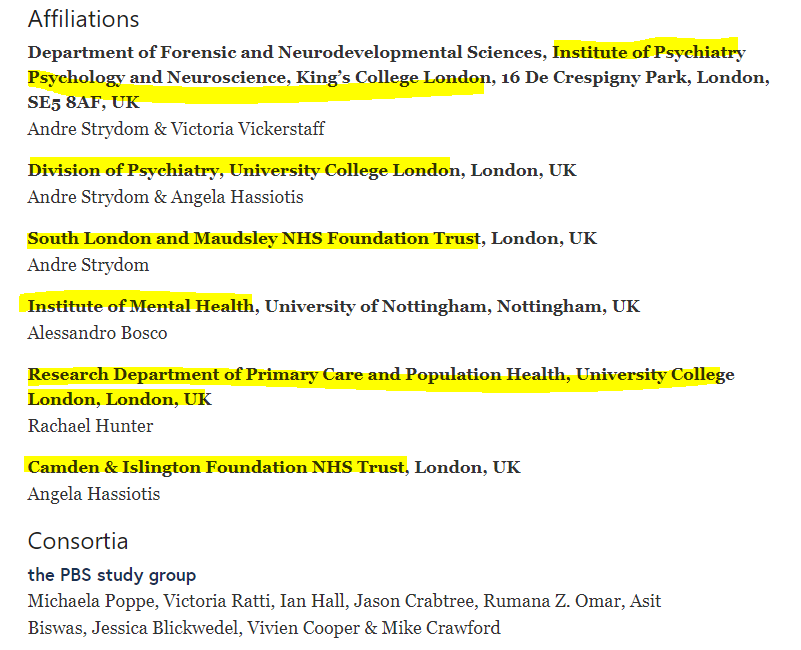Today I would like to talk about this recent research paper.
https://bmcpsychiatry.biomedcentral.com/articles/10.1186/s12888-020-02577-1
It& #39;s">https://bmcpsychiatry.biomedcentral.com/articles/... about Positive Behaviour Support, and whether it works to stop & #39;behaviour& #39;.
You& #39;ll see it& #39;s in a Psychiatry journal. Let& #39;s look at the authors first:
https://bmcpsychiatry.biomedcentral.com/articles/10.1186/s12888-020-02577-1
It& #39;s">https://bmcpsychiatry.biomedcentral.com/articles/... about Positive Behaviour Support, and whether it works to stop & #39;behaviour& #39;.
You& #39;ll see it& #39;s in a Psychiatry journal. Let& #39;s look at the authors first:
Ah, people from very serious Psychiatry departments in major universities, related major mental health departments, NHS Trusts. Not a group of fervent activists, I& #39;m sure you& #39;ll agree.
So, what did they find?
So, what did they find?
Well, they looked at 246 people - those with learning disabilities and autistic people.
Positive Behaviour Support was done to them.
"The present analysis.. suggests that the intervention did not reduce challenging behaviour in ASD+ participants."
Positive Behaviour Support was done to them.
"The present analysis.. suggests that the intervention did not reduce challenging behaviour in ASD+ participants."
That& #39;s quite awkward.
So, summarising, this is a team of researchers from well respected Institutions, and they couldn& #39;t find evidence of Positive Behaviour Support working, for autistic people.
I think I& #39;ll just leave this here, and wave gently at those commissioning it.
So, summarising, this is a team of researchers from well respected Institutions, and they couldn& #39;t find evidence of Positive Behaviour Support working, for autistic people.
I think I& #39;ll just leave this here, and wave gently at those commissioning it.
Incidentally, the test used was the Aberrant Behaviour Checklist. Let& #39;s have a look at wider examples of what& #39;s measured in that:
Depressed.
Cries & #39;inappropriately& #39;
Listless.
Seeks isolation.
Withdrawn.
Fixed face expression.
Watches others.
Doesn& #39;t like physical contact/
Depressed.
Cries & #39;inappropriately& #39;
Listless.
Seeks isolation.
Withdrawn.
Fixed face expression.
Watches others.
Doesn& #39;t like physical contact/
Sits in one position.
Inactive.
Shows few social reactions
Stimming
Too active
Disobedient
Doesn& #39;t do as they are told
Talks too much
Talks too loudly.
So, these are the kinds of things it didn& #39;t work on.
Inactive.
Shows few social reactions
Stimming
Too active
Disobedient
Doesn& #39;t do as they are told
Talks too much
Talks too loudly.
So, these are the kinds of things it didn& #39;t work on.
If we& #39;re alleging that PBS helps people have good lives, but this isn& #39;t measured in this paper....how does that fit with the list of things they& #39;re checking for?
PBS is evidence-based, yes? So how is it measuring & #39;good lives& #39;?
PBS is evidence-based, yes? So how is it measuring & #39;good lives& #39;?
I& #39;m quite fond of the old Positive Support systems, as I often say. The ones similar to the Gentle Teaching approaches. Colleagues of mine use them, and call them & #39;PBS& #39; in order to tick the right box on the CQC forms. But they& #39;re actually not based on behaviourism at all.
Now, if we want a system that works, I can recommend several that are fabulous.

 Read on Twitter
Read on Twitter


